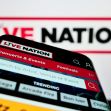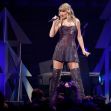After Ticketmaster’s troubles and politicians’ growing concerns about the company’s market power in light of Taylor Swift’s recent “ticketing debacle,” the Ninth Circuit has handed the company some good news. A class action suit that alleged antitrust violations by Ticketmaster has been dismissed by the Ninth Circuit, which affirmed a lower court’s decision that ordered plaintiffs to submit to arbitration.
Lead plaintiff Mitch Oberstein, who personally purchased 40 tickets from Ticketmaster and its predecessor Live Nation Entertainment, along with co-plaintiffs from two other states, sued Ticketmaster in 2020, alleging “monopoly power and anti-competitive practices” that resulted in “supra-competitive fees” for concert tickets.
Plaintiffs argued that Ticketmaster’s “Terms of Use” were not valid because they did not identify Live Nation as a party to their arbitration requirement nor did they notify ticket purchasers about whether they were willing to accept arbitration in the event of a dispute. Neither of these claims was accepted by either the trial or appellate courts.
In a unanimous decision by a three-judge panel, authored by Circuit Justice Danny J. Boggs, the Ninth Circuit affirmed the opinion of Presiding Justice George H. Wu of the United States District Court for the Central District of California on February 13.
Oberstein’s original complaint alleges that the 2010 merger between Ticketmaster and Live Nation resulted in a “stranglehold” on American concert venues. Concert sites were forced to pick Ticketmaster as their “primary ticket provider” if they wanted Live Nation Entertainment to book star entertainers at their venues. This arrangement prompted concert site owners to charge “exorbitant fees” for concert tickets.
Plaintiff-appellants originally sued for “anti-competitive practices” in violation of the Sherman Antitrust Act, which was passed back in 1890 to outlaw monopolistic business practices. Ticketmaster moved to compel arbitration because it claimed that its website gave ticket purchasers “constructive notice” of its compulsory arbitration terms under both California and Massachusetts laws.
Justice Boggs first explained that the Ninth Circuit has jurisdiction over the matter under the Federal Arbitration Act that “requires courts to compel arbitration of claims covered by an enforceable arbitration agreement.” This Act requires courts to determine if a valid arbitration agreement exists. Oberstein and his class had two primary arguments to convince the court that it did not.
The opinion explains that California law would govern the arbitration issue. The law requires valid arbitration agreements to have four elements: parties capable of contracting, the consent of those parties, a “lawful object” and “sufficient cause or consideration.” Boggs explained that Ticketmaster’s procedures for ticket purchasing via its website would meet those conditions. He said the website does not include “pure clickwrap” which would make customers check a box if they agreed to submit to arbitration. However, the Justice said, those who click the “Terms of Use” hyperlink are directed to a page that describes the terms of acceptance. That page includes the full legal name “Live Entertainment, Inc.,” which is referenced in the arbitration provision. Terms of Use explain that consumers must address claims to Live Nation, which is the “relevant contact for questions, comments or complaints.” Live Nation’s address is also given. The Terms say that although the name Ticketmaster LLC does not appear, “a user could find them by clicking on the “Purchase Policy link.”
In addition to defeating plaintiffs’ arguments because Live Action’s name and contact information are included, Boggs wrote that “California law does not require that corporate parties to a contract use their full legal names.” It just must “make it possible for a reasonable user to identify the parties to the contract.” Here, it does, and all precedents cited by plaintiffs were “misplaced.” In addition, plaintiffs failed to cite any authority to support their claims. Boggs said, “It is difficult to imagine who would be a party to the arbitration agreement if not, at the very least, the entity specifically listed as the addressee for the initiation of the arbitration disputes.”
Boggs then addressed plaintiffs’ primary argument – the lack of “constructive notice” of compelled arbitration. Although ticket purchasers were not required to click on an “I agree” box when they were buying concert tickets, the Ninth Circuit found that Ticketmaster “did enough to provide constructive notice of its arbitration agreement terms.” This is because ticket buyers are “presented with a confirmation button” at “three independent stages – when creating an account, signing into an account, and completing a purchase.”
Therefore, the opinion said, “We agree with the district court that a reasonable user would have seen the notice and been able to locate the Terms via hyperlink. And, “critically” the Terms of Use “is conspicuously distinguished from the surrounding text in bright blue font, making its presence readily apparent.” He concluded, “Constructive notice was established as a matter of law.”
The Ninth Circuit did not address the question of whether Ticketmaster, now merged with Live Nation, has a monopoly on concert productions. That will have to wait for another venue. And one may be coming shortly because of the Senate Judiciary Committee’s recent hearing, in what New Music called a “Bipartisan Congressional Grilling Following Taylor Swift Ticketing Fiasco.” Also, the Justice Department is conducting an antitrust investigation into the Ticketmaster-Live Nation merger. And on February 1, President Biden gave details about his proposed “Junk Fee Prevention Act” which is designed to prevent excessive ticket fees and other purchasing provisions that may bilk consumers. This is part of his plan to “lower the huge service fees that companies like Ticketmaster slap onto tickets for concerts or sporting events that can easily add hundreds of bucks to a family’s night out,” the President said.






